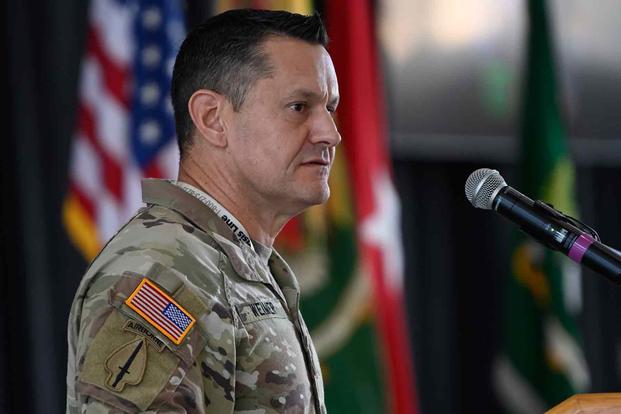Command Sgt. Maj. Michael Weimer is set to become the Army's next top enlisted leader in August, replacing Michael Grinston, who is due to retire shortly after the handoff.
Weimer brings a significant amount of combat experience to the position, some details of which are being publicly reported here for the first time, including details on multiple Purple Hearts and Bronze Stars for valor.
He takes the role as the service transitions from two decades of the Global War on Terror to what would superficially appear to be peacetime, with Army planners having given themselves a self-imposed deadline to shift equipment and doctrine to be ready for large-scale conventional warfare by the 2030s.
The service's top enlisted leaders all have come from combat arms roles, mostly with infantry, cavalry or artillery backgrounds, and typically have thick combat resumes, going back to the service's first top enlisted leader, William Wooldridge. Wooldridge landed on French beaches on D-Day and was later awarded two Silver Stars, one for actions during the Battle of Aachen in Germany and another during the Battle of the Bulge.
Details of Weimer's awards come from their respective citations, which were reviewed by Military.com, though most contained limited specific information on operations.
All awards were for actions in Iraq, where Weimer appears to have served with 7th Special Forces Group, based on a review of his official bio and the years he was with that unit. Weimer was not made available for an interview ahead of this story's publication.
On April 2, 2003, Weimer, a sergeant first class at the time, received a Purple Heart and Bronze Star medal with "V" device for valor while serving as an assault team member and team breaching specialist -- the soldier typically in charge of taking down doors and other obstacles as part of raids on buildings, often with explosives.
"Sergeant First Class Weimer demonstrated extreme courage in the face of the enemy assault," the bronze star citation reads. "During the course of the battle, Sergeant First Class Weimer courageously completed his tasks despite the hail of enemy fire impacting all around him, the arduous terrain, and a nebulous threat environment that posed at considerable risk in order to eliminate the threat to his teammates and members of his unit."
For actions on Sept. 4, 2004, Weimer, a master sergeant at the time, earned the Joint Service Commendation medal with "V" device for valor.
"Master Sergeant Weimer displayed the highest degree of professionalism, sound judgment, and technical and tactical competence during the extremely sensitive Secretary of Defense directed operation," the award says. "His exceptional leadership and his untiring pursuit of excellence were major factors in his element's ability to successfully accomplish its mission."
It is unclear what operation Weimer participated in that earned him the Joint Service Commendation, but 2004 was an especially bloody time in the war in Iraq. That same September week is when U.S. fatalities topped 1,000.
On April 11, 2005, Weimer, still a master sergeant, was a part of a helicopter assault on a "well defended" enemy position as he and his team came under heavy fire. During that fight, Weimer killed multiple enemy personnel, including a suicide bomber, earning him a Bronze Star with valor device, according to the award citation.
Just a month later, on May 2, Weimer and his team came under heavy fire while in a helicopter. He later organized treatment for multiple wounded soldiers, earning him another Bronze Star with "V" device.
"Master Sergeant Weimer came under an intense enemy attack on his unit's helicopter," according to the citation. "He displayed valorous courage, sound judgment, and exceptional proficiency while conducting treatment and triage of four wounded comrades, his actions were paramount to ensuring mission success and the safety of the wounded, through his distinctive accomplishments."
Weimer was wounded again, two years later on Jan. 1, 2007, earning another Purple Heart, though the citation has no specifics behind the injuries or mission.
Weimer will be the first top enlisted leader to have served his entire career in special operations, earning his green beret in 1996 and serving as a weapons sergeant. He spent most of his career with 7th Special Forces Group and various roles in Army Special Operations Command.
Out of the 16 sergeants major of the Army so far, three others have some experience in special operations but all spent a significant chunk of their careers or started out in the conventional Army.
Glen Morrell, who served as sergeant major of the Army in the mid '80s, initially served in artillery units before moving into Special Forces and deploying twice to Vietnam with 5th and 8th Special Forces Group as a heavy weapons sergeant; he later worked in intelligence.
Richard Kidd, who was the sergeant major of the Army in the early '90s, was a Green Beret but spent the bulk of his career in regular units and overseeing training programs. George Dunaway, the second sergeant major in the Army, sitting in the role from 1968 to 1970, served in 1st and 5th Special Forces Group during the Vietnam era, after spending the first half of his career in the 82nd and 101st Airborne Divisions.
-- Steve Beynon can be reached at Steve.Beynon@military.com. Follow him on Twitter @StevenBeynon.
Related: Michael Grinston's Quiet War to Help Make the Army More Lethal, Wokeness Hysterics Be Damned













